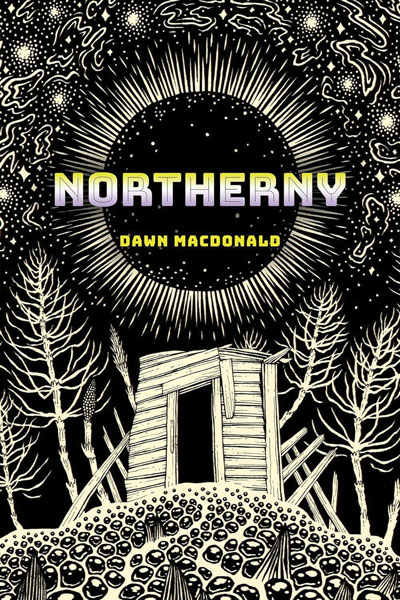In Strange Things (1995), Margaret Atwood questioned some of the most popular and romantic literary stereotypes about Canada’s North. According to Atwood, previous generations of poets liked to personify the North as a dangerous spirit, a beautiful but icy siren who would beckon and tempt (usually) men to their (usually) deaths by freezing and/or starving. Other writers depicted the North as the ultimate challenge, the final frontier, a test of manhood. Either way, our history and literature are full of bold explorers, greedy gold-seekers and others who fell victim to its almost irresistible allure.
Dawn Macdonald is not one of them. Born and raised (off the grid, according to the back-cover notes) in the Yukon, Macdonald describes a North which is anything but stereotypical, or stereotypically romantic. “I’m so not interested in writing” says the speaker of “A Boring Poem,” “any Northern/Nature/Yukoner poems about the Northern Lights and my trusty-sled-dog-see-your-breath-adventure.” Instead there are insider details, some humorous and others not so funny. In one of the list poems, for example, each line begins with “Every Yukoner”: “Every Yukoner has tried hitching the backyard chickens to the kicksled as a labour-saving mode of transportation”; “Every Yukoner has died of a fentanyl overdose”; “Every Yukoner sells ice to every other Yukoner.”
Elsewhere in the collection, trendy Northern art is critiqued as “in-migrant art” (and “in-migrants” are defined as “mostly White, mostly city. Mostly seekers. Prospecting for personal growth.”) We also hear the voice of these self-help prospectors, tempted by the allure of the North: “wow that’s so real, those Northern Lights sure do resonate on a hipster wavelength.”
Conversational, tangential, at times funny, at times baffling, these poems can also dazzle with their imagery. The vaguely disturbing “Quickness,” for example, describes a frog as “rot-coloured,/ leaf-veined, a splot/ of bonefat, a wriggling towelette.” All of the poems “turn out to have animals in them,” admits Macdonald; it may not be typical nature poetry, but foxes, deer, mice, eagles and owls all show up. And I don’t think I’ve ever read poetry about living in harmony with silverfish before! In one poem, wasps hang their “sting-centric disco ball from the roofline”; in another, a kingfisher is “just a bird with a great name/ a flopamop with a marketing department.”
There’s all kinds of clever wordplay here, unexpected twists on familiar expressions, such as “The weekly squeal gets the geese.” And my favourite line, which I’ve been sitting with ever since reading it, is “Puns are koans’ country cousins.” Amazing! This collection is odd, unpredictable and fun to read out loud.
Kelly Shepherd is the author of Insomnia Bird (Thistledown).
____________________________________________


